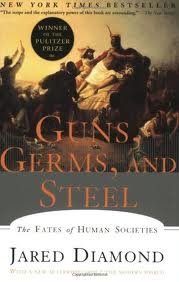development based on race.
Until around 11,000 b.c., all peoples were still Stone Age hunter/gatherers. At that point, a great divide occurred in the rates that human societies evolved. In Eurasia, parts of the Americas, and Africa, farming became the prevailing mode of existence when indigenous wild plants and animals were domesticated by prehistoric planters and herders. As Jared Diamond vividly reveals, the very people who gained a head start in producing food would collide with preliterate cultures, shaping the modern world through conquest, displacement, and genocide.
The paths that lead from scattered centers of food to broad bands of settlement had a great deal to do with climate and geography. But how did differences in societies arise? Why weren't native Australians, Americans, or Africans the ones to colonize Europe? Diamond dismantles pernicious racial theories tracing societal differences to biological differences.
He assembles convincing evidence linking germs to domestication of animals, germs that Eurasians then spread in epidemic proportions in their voyages of discovery. In its sweep, Guns, Germs and Steel encompasses the rise of agriculture, technology, writing, government, and religion, providing a unifying theory of human history as intriguing as the histories of dinosaurs and glaciers.
Comment: This will be a short comment. I was lent this book recently, in Portuguese, by one of my friends who likes to give me surprising things to try, usually genres I don't gravitate towards. This is a non-fiction book about the way human societies developed and why some are now stronger than others.
This book focuses on an interesting theme, the fate of human societies and some of the issues that affected the way communities developed and fought and originated what we have nowadays.
The book is divided into chapters where the author talks about several subjects and situations that allowed, so to speak, the world, and some countries specifically, to develop more than others and how.
This was very interesting yes, and some chapters were quite interesting to read. I thought I would be taking longer to read but the writing is surprisingly easy. Of course, many explanations didn't seem as easy to grasp even with historical support.
What I think stopped me from thinking this a better work was how some situations seemed to come out of nowhere and the parts related to agriculture and its practices and how that was the beginning of the world's downfall... well, I get his reasoning but does that explain nepotism and unfairness? I can't say this actually life or death for me...
The main question the author wants answered is why some countries or nations have so much more empirical and historical baggage than others and why Europeans for instance and not Asians. This allowed for interesting ideas and I did learn a lot about other cultures and some of their history, but overall I didn't finish the book thinking this is the best answer to explain the world.
Would it be too gross of me to say my favorite chapter was about diseases and how those helped to change the way we live and how it affected the wars and fights and lives in several places?
The subjects of guns and steel isn't as developed but understandable if one thinks about the methods some nations destroyed others. The fact is, some nations developed faster and stronger than others. The author tries to explain why and how and in a way this is interesting but it's not exactly a new idea...
I think that, for someone not connected to this field of study or very knowledgeable about history and sociology and anthropology, this can be an entertaining and informative read. But is it the only truth or only way to explain things? Probably not but then again, each person reads the same differently.
I think this book was interesting, the author told things I liked learning about but I wasn't exactly amazed by it, at least not from my general reader perspective.
Grade: 6/10

No comments:
Post a Comment